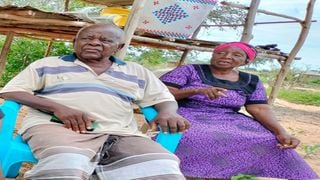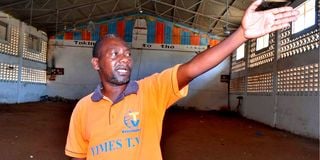
Ms Ruth Kadzo Kahindi (right) at her home in Marereni in Malindi, Kilifi County, during an interview with Nation. She is flanked by her husband David Kahindi.
| Farhiya Hussein | Nation Media GroupNews
Premium
'I started a church with Mackenzie, then he ruined our lives': Tale of fight for church and the rise of a cult leader
What you need to know:
- Ruth Kahindi tells the story of a ‘disciplined young man’ with whom she founded a church and who rose to become an infamous cult leader.
- She says she had a dream to start a church, and acted on it by asking Mackenzie to be her partner in starting one in 2003.
- They found land and started the ‘House of the Lord’. Congregants were urged to donate building materials to get their church off the ground.
Ms Ruth Kadzo Kahindi remembers Paul Mackenzie as a poised and disciplined young man, but his week-long trip to Mombasa to lead a sermon was to change him.
“I saw potential in Mackenzie as a preacher,” she says with regret.
Daily Nation understands that the two met while attending Sunday services at the same church — the Malindi Baptist Fellowship Church. They stopped worshipping there and left in the early 2000s to start a church together, Good News International Church.
“I was so sick that I was bedridden. According to the doctors, no medicine could have cured me. I had ulcers and heart problems. At that time, I was living with my daughter in Ukunda and had to move back to my husband’s home in Malindi as I waited for my last days,” says Kahindi.
'I had a dream'
“While in Malindi, I had a dream that urged me to open my own church,” recalls Kahindi.
She acted on the dream and asked Mackenzie to be her partner in starting the church in 2003.
Kahindi remembers that Mackenzie had had a falling-out with the owners of the previous church after his controversial sermons, which saw relatives of the church leaders kick him out.
“I remember that day he had read a Bible verse from the book of Ezekiel, and the relatives interpreted Mackenzie's teachings differently; they concluded that he wanted their father, the owner of the church, dead. They kicked him out,” says Kahindi.
The two found a place and started the ‘House of the Lord’. Congregants were urged to donate building materials to get their church off the ground. She says that the first Sunday the church started its services, Kahindi did not attend; she had to keep her husband informed. But the following Sunday, she was there. The congregation began to flock to their church, forcing them to expand.
“Mackenzie bought land in Furunzi, Malindi, and built the church, but the congregation chipped in with building materials. It was not one man's job or responsibility,” says Kahindi.
All the while, her daughter Mary Kahindi and son-in-law Smart Mwakalama were selling food in a small cafe they had set up next to the church.
“We got a huge number of followers; people from all over Malindi flocked to our church; it was a blessing. His name, Mackenzie, became known outside Malindi and he was invited to Mombasa for a week,” says Kahindi.
Start of controversial sermons

Good News International Church Pastor Paul Mackenzie during an interview with the ‘Nation’ in Kilifi County on March 24, 2023. He claimed at the time that he closed his church in August 2019 and no longer preaches.
For them, this was the turning point and a new Mackenzie was born. They had no idea who he was.
“He started preaching things that we did not agree with, telling the congregants not to take their children to school or to go to the hospital when they were sick. I tried to talk him out of it, but unfortunately, I did not succeed,” she says.
In the midst of their arguments, Mackenzie’s wife died.
Kahindi explains that during the funeral, a preacher was invited to give a special sermon to remind Mackenzie of who he was and his pastoral journey.
Instead, Mackenzie stood up and discredited everyone present except Mary and Smart (Kahindi’s daughter and son-in-law).
“I left the church to him. He was a little boy and I saw there was no need for me to argue with him. They continued with their teachings; it is sad that my daughter was part of it all,” says Ms Kahindi.
“People quit their jobs, parents stopped taking their children to school, women were told to shave their heads and to marry within themselves. It was at this point that my daughter Mary and her husband closed their restaurant and joined Mackenzie’s church leadership,” says Kahindi.
Forced out of school
Mary’s first-born daughter, Elizabeth Sidi, was among the children who were forced out of school, a situation that pained her grandmother, Kahindi.
“Sidi was a bright student; she was always number one in her class and in school. She wanted to be a pilot. I married her off when she was 19 and she died heavily pregnant,” she says.
According to Kahindi, Sidi worked as a crew member on Mackenzie's Times TV channel.
That would be the last communication between her, the children and Mackenzie.
“One day my daughter called to tell me that Mackenzie had bought land and that I should leave because 100 acres were all mine, but I refused.”
Kahindi says the next time she heard of her daughter and her family was recently, when she was following the headlines on Mackenzie's cult that had led to the starvation of more than 100 people.
Smart is currently in police custody as one of Mackenzie's aides.
“They should not release him; he has cost us our families. I do not know where my daughter and grandchildren are. Smart should be jailed for life,” says Kahindi.
During the interview, her husband, David Kahindi, was at a loss for words; his expression told the story of a man in grief and regret.





